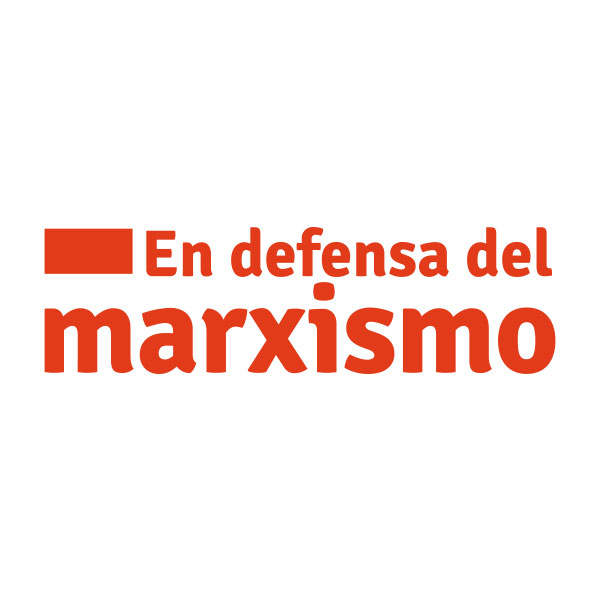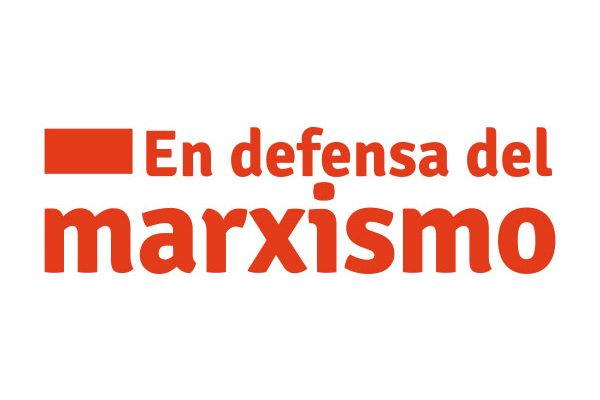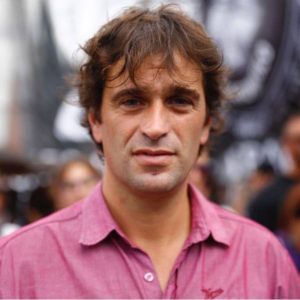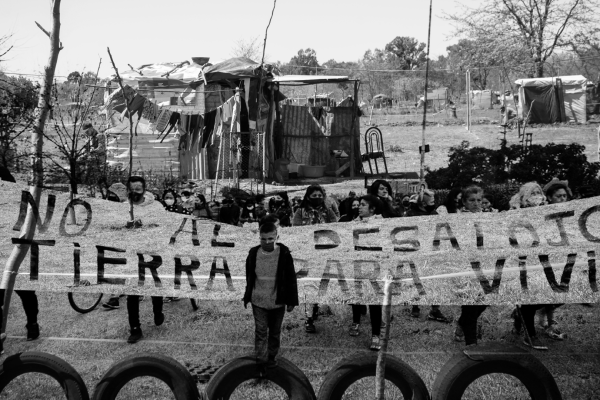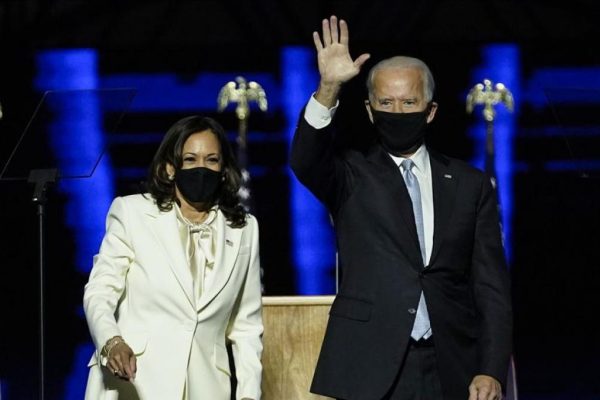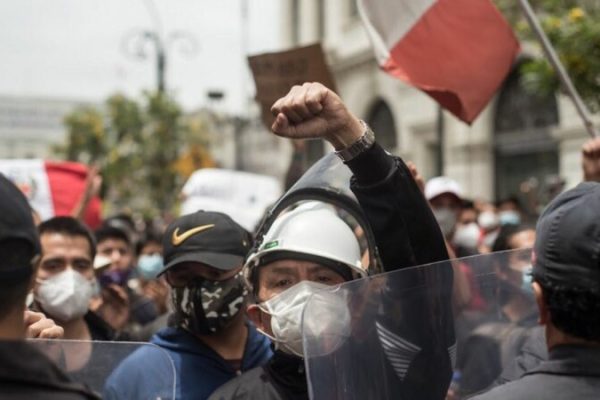Why “World Revolution”?
Why “World Revolution”?
Foreword Why “World Revolution”? Savas Michael-Matsas [1]
The international working class and all popular, oppressed, exploited, impoverished and socially excluded masses all over the world are experiencing social devastation, war, mass migration, fierce battles on multiple fronts, a permanent struggle for life. The drama is not ending. The greatest challenges in history are in front.
Ten years after the collapse of Lehman Brothers, the world financial meltdown and the Depression that followed, the still unresolved global capitalist crisis- “the worst in history” according to Ben Bernanke, former Chairman of the US Federal Bank- leads through convulsions towards new explosions.
The extraordinary measures taken by central banks and governments (“quantitative easing”, near zero or negative interest rates, stimulus packages etc) to halt the descent into the abyss failed to provide a viable exit from the on-going catastrophe. They produced, on the contrary, new, monstrous speculative “bubbles”, worse than those that burst in 2007-2008, huge time bombs ready to explode with enormous social and political implications. The attempts of the capitalists to avoid the coming threats by turning into a reverse course, by ending quantitative easing, globally raising interest rates etc. as well as the rise of economic nationalism, protectionism and the escalation of trade and currency wars internationally, brings nearer the fall to new depths of depression. Argentina’s and Turkey’s economies and currencies in free fall are only the first advanced signs of the thunderstorm coming on the global arena.
The much celebrated “globalization” of capital led to the globalization of all its contradictions and finally to its own implosion. In the Bicentenary of Karl Marx’ birth, his analysis and prognosis, in his magnum opus Das Kapital, find their most dramatic historical vindication: “The real barrier of capitalist production is capital itself”.
The insolubility of the crisis is strenghtening both the tendency towards imperialist war as well as the tendency towards social upheavals, popular rebellions- and revolution.
The international world order, as it was established after World War II, is falling apart under the impact of the global crisis and the sharpening imperialist antagonisms and international conflicts. No capitalist institution, national or international, will remain intact.
Trump’s America downsized the Trans Pacific Partnership(TPP), is threatening Canada and Mexico with dissolution of NAFTA, is accelerating the disintegration of the EU, even the existence of NATO is being put under question. Donald Trump and his policies are not an isolated case of insanity but the symptom, the brutal manifestation of the historical forces of disintegration unleashed by US and world capitalism in advanced decay.
The European Union has entered an on-going irreversible process of decomposition: the Eurozone debt crisis, Greece, Brexit, Salvini’s Italy, the splits between Eastern and Western, Northern and Southern Europe, the breaking up of the French-German axis of the EU with a political regime crisis in both countries.
From the war volcano of the Middle East to the Balkans and the Eastern borderlands of Europe in Ukraine, from the Caucasus to Central Asia to South China Sea and Korea, imperialism is already in confrontation, directly or indirectly, with Russia and China to fragment and re-colonize them, absorbing them in world capitalism.
From the other side, a new upsurge of the masses is on the way.
In the Middle East and North Africa, despite the retreat of the initial revolutionary tide and the inferno of imperialist aggression and wars, there is a series of revolts in 2018 against social misery and unemployment in Tunisia, Morocco, Iran, Iraq, Jordan, the Great March of Return of the Palestinian youth in Gaza, even mass mobilizations in Israel itself against the new apartheid style Basic State Law. It is becoming clear, including in IMF reports, that the driving forces that produced the 2011 revolutions are still at work.
In Europe, polarization manifests itself by regime crises, the rise of the far right, and the decay of bourgeois democracy, from the one side, and, from other side, the unrest among the resisting masses: continuing workers struggles in France against the anti-labor laws, the Catalan national crisis and the fall of the right wing Rajoy government in Spain, the popular revolt in Romania against the corrupt government etc.
In Latin America, the exhaustion, decline and fall of the “national-popular” bourgeois governments do not correspond to an exhaustion of the revolutionary potential as the struggles in Brazil against the right wing coup, the tremendous women’s movement in Argentina for the right to a legal, safe and free abortion against the collusion of the State and the Church or the popular rebellion and overthrow of the government in Haiti demonstrate.
The central question posed by the crisis and the struggles that it inescapably generates is not the fighting capacity of the masses that defeatists and professional skeptics in a demoralized Left and far Left usually underestimate. The crucial issue is one of revolutionary orientation, consciousness, strategy, tactics, program, i. e. of a revolutionary organization, a combat Party able to learn through its constant intervention in the class struggle how to win and lead the masses to their own self-emancipation.
Already discredited by the role and function of the traditional bureaucratic machines of Stalinism and social democracy, after the inglorious although tragic demise of the Soviet Union in 1991, the concept of the revolutionary Party shared the fate of all concepts and principles associated with the October Revolution and its distortion in the so-called “actually (non-)-existing Socialism”. It was rejected together with the prospects of social revolution- particularly of a world socialist revolution- of Socialism, and Communism, falsely identified with the horrendous crimes, formalist rhetoric, historical failure and final collapse of the Stalinist bureaucratic regimes.
The 1989-1991 myths celebrating “the end of History” and the “final and complete victory of liberal capitalism”, particularly after the eruption of the global crisis in 2007, look completely ridiculous and have been abandoned. But all kinds of fetishist illusions from the high moments of finance-capital globalization remain and historical disorientation and confusion still prevail in the Left. Le mort saisit le vif! Post-1991 historical pessimism and political skepticism feed, within the workers and popular movement, demoralization, defeatism, paralysis.
As the contradictions of capitalist globalization started to emerge, social movements experienced a revival early in the 21st century, and the established bourgeois political parliamentary systems were shaken by the post-2007 crisis, the prevailing response on the left was to try to find a “radical” substitute to revolution, which was considered as a non feasible and non desirable option belonging irremediably to the past century.
The dominant tendencies in a revived “radical” and social Left were either to turn to a fetishized, sheer “movimentism” or, after its failure, to seek a path beyond the historical dividing line between reform and revolution, combining the parliamentary electoral struggle for the conquest of government (bourgeois) power with support by extra-parliamentary social movements. “Movimentists” and “radical leftists” cultivated the illusion of a way out of the capitalist crisis, by the gradual creation of “emancipated spaces” within the framework of capitalism and of its State.
In all cases, class politics and the political independence of the working class from bourgeois forces were abandoned, in the name of an indefinite “multitude” or of a “broad front” or of “broad parties” and other heterogeneous loose coalitions. The political bankruptcy of such “experiments” to avoid a revolutionary path, Marxist strategy, and combat Party organization is now clear for all to see, from the Latin American various types of “populism” in Brazil, Uruguay, Argentina, Ecuador, Bolivia or Venezuela to the disastrous European experiences of Syriza’s capitulation in Greece or of the right wing course of Podemos in Spain and of the Bloco de Esquerda in Portugal, or of the pathetic failure of “broad parties” like the NPA in France.
The inverted mirror image of left liberalism and opportunist liquidationism is sectarian fossilization, the inertia of groups masquerading their parasitism under a pompous self-proclamation as “revolutionary” and hiding their abstentionism from the living political class struggle with sterile denunciations of other organizations in the workers movement, ultimatism, rejection of any united class action and eclectic propagandist repetition, out of context, of classical Marxist quotations. These sectarian groupings and circles ignore completely the warnings of Leon Trotsky that Marxism is a dialectical materialist “method of analysis of social relations, not of texts” (In Defense of Marxism), “the highest qualitative and quantitative critical appreciation of objective reality from the standpoint of revolutionary action” (The New Course).
There cannot be a revolutionary movement and/or Party without learning from the recent strategic experiences as well as from all revolutions and counter-revolutions of the past, without a critical assessment and decisive break with Stalinism from the left, the revolutionary Marxist standpoint, not from the right or liberal view. The slide to left liberalism in conditions where social democracy itself was disintegrating and converting into neo-liberalism became the main form of capitulation to the capitalist status quo.
Against political nihilism on the Left, which was a shameful surrender to the bourgeois triumphalism of the late 20th century, what was and is needed is a creative re-appropriation of the theoretical-political legacy of Marx, the October Revolution and revolutionary Marxism. An indispensable theoretical heritage to be taken not as the metaphysical end of thought but as the necessary foundation for further development of revolutionary theory and practice, a non-dogmatic opening to what is new in history, to every liberating experience of struggle for universal human emancipation, Communism. A break from the liberal left, with or without a “radical” disguise, necessitates paying great attention to what Lenin emphasized again, in 1923, against Soukhanov and the mechanical, Kautskian, “Marxist orthodoxy” of the Second International: “They have not understood at all what is essential in Marxism: its revolutionary dialectics”. This is the most profound demarcation line between Marx and Marxism, on the one hand, and their liberal or social democratic or Stalinist caricatures, on the other.
No revolutionary movement and/or Party can be built with historical amnesia, nor without living revolutionary theory, just by empirical improvisations in the everyday class struggle or by sectarian self-isolation in a self-made ideological prison of dead schemata. Soon or later such an empiricism or dogmatic schematism, blind political or syndicalist activism or sectarian abstentionism finishes up in opportunist adaptation and capitulation to the limitations and pressures of the national bourgeois milieu.
“As it is impossible to build Socialism in a single country, it is also impossible to have a revolutionary socialist policy in a single country”. This statement by Leon Trotsky is more actual and solid than ever before in our imperialist epoch of capitalist decline, especially as capitalist globalization produced the deepest international interconnection and the world character dominates the uneven and combined historical development. A real, combat workers revolutionary party can be built only as a part of the struggle to build the workers revolutionary International.
The specific characteristics in every national social formation play, undoubtedly, an essential role for the elaboration of a revolutionary strategy, tactics and program.
But these characteristics have to be integrated in the world historical process. This is the material basis for militant internationalism in concrete practice, not just for an abstract “solidarity of the peoples”, in moralistic terms. And an organized, active, revolutionary internationalism, i. e. an International, is the only force which can really lead the struggle to defeat world capitalism in decline, the imperialist war drive and the rising counter-revolutionary far right nationalist trends produced by its global crisis.
Our international current is formed by the convergence of revolutionary Marxist parties and organizations from Latin America, Europe, and later the Middle East, coming from different origins in the fragmented international Trotskyist movement. It emerged in the aftermath of the disintegration of the Soviet Union, in opposition to the prevalent defeatism on the Left, struggling, for the re-foundation of the Fourth International, first as a Movement (MRFI) and then, after its founding Congress in 2004 in Buenos Aires, as the Coordinating Committee for the Refoundation of the Fourth International (CRFI). Our re-groupment was based definitely on an analysis of the world situation and revolutionary program voted in 2004. But also, first and above all, it was based on the historical strategic estimation that our transitional epoch, the historical cycle opened world-wide by the October 1917 socialist Revolution was NOT closed with the collapse of the Soviet Union and the turn to capitalist restoration in Russia, China, and Central-Eastern Europe. This was and is the fundamental dividing line between us and most other tendencies and left organizations internationally.
From this vantage point, the Fourth International founded by Trotsky and his comrades in 1938 had as a historical task not solely to fight Stalinism- now, after 1991, in ruins- but to complete on a world scale the work of revolutionary transformation and transition to world Communism started in 1917. The crisis of the historical transition, the protracted delay of the social revolution particularly in the metropolitan centers of world capitalism, the bureaucratic degeneration in the USSR with all its disastrous implications and its final demise, the fragmentation and disorientation of the Fourth International after Trotsky, are tremendous obstacles, but ones which should and could be overcome by the international revolutionary means of the proletarian masses and of their organized vanguard. The deepest needs of human social life collide irreconcilably with the barrier of a decayed global capitalist order, as the current unresolved global crisis demonstrates in the most irrefutable way.
The unfulfilled tasks posed by history itself have to be fulfilled. They are more urgent than ever today. This makes necessary the rebirth of the International born, under the most difficult conditions in 1938, out of the necessity to complete the world revolution started in October 1917,and founded by the last vanguard of Bolshevik opponents to Stalinism- the Fourth International.
Not another re-groupment of sects or a loose federation of nationally oriented groups but a real International, fighting in the world arena to change the world.
Our international theoretical-political organ World Revolution, whose publication was decided at the International Conference called by the Partido Obrero of Argentina, the Partido de los Trabajadores of Uruguay, the EEK of Greece, and the DIP of Turkey in Buenos Aires in April 2018, comes to serve this historical cause. Its ambition and aim is to become an international reference point of militant Marxism for principled debate, political clarification, programmatic demarcation, theoretical re-arming with revolutionary materialist-historical dialectics as a guide of action, regrouping and unification of the revolutionary vanguard fighters now dispersed internationally in fragmentary struggles.
Our battle cry is: for the Permanent Revolution and communism, build the International of world socialist revolution!
[1] Savas Michael Matsas is the General Secretary of EEK (Workers’ Revolutionary Party) and a writer in newspaper Nea Prooptiki (New Perspective), and one of the founders of the Christian Rakovsky Balkan Socialist Center and RedMed web network.
Foreword Why “World Revolution”? Savas Michael-Matsas [1]
The international working class and all popular, oppressed, exploited, impoverished and socially excluded masses all over the world are experiencing social devastation, war, mass migration, fierce battles on multiple fronts, a permanent struggle for life. The drama is not ending. The greatest challenges in history are in front.
Ten years after the collapse of Lehman Brothers, the world financial meltdown and the Depression that followed, the still unresolved global capitalist crisis- “the worst in history” according to Ben Bernanke, former Chairman of the US Federal Bank- leads through convulsions towards new explosions.
The extraordinary measures taken by central banks and governments (“quantitative easing”, near zero or negative interest rates, stimulus packages etc) to halt the descent into the abyss failed to provide a viable exit from the on-going catastrophe. They produced, on the contrary, new, monstrous speculative “bubbles”, worse than those that burst in 2007-2008, huge time bombs ready to explode with enormous social and political implications. The attempts of the capitalists to avoid the coming threats by turning into a reverse course, by ending quantitative easing, globally raising interest rates etc. as well as the rise of economic nationalism, protectionism and the escalation of trade and currency wars internationally, brings nearer the fall to new depths of depression. Argentina’s and Turkey’s economies and currencies in free fall are only the first advanced signs of the thunderstorm coming on the global arena.
The much celebrated “globalization” of capital led to the globalization of all its contradictions and finally to its own implosion. In the Bicentenary of Karl Marx’ birth, his analysis and prognosis, in his magnum opus Das Kapital, find their most dramatic historical vindication: “The real barrier of capitalist production is capital itself”.
The insolubility of the crisis is strenghtening both the tendency towards imperialist war as well as the tendency towards social upheavals, popular rebellions- and revolution.
The international world order, as it was established after World War II, is falling apart under the impact of the global crisis and the sharpening imperialist antagonisms and international conflicts. No capitalist institution, national or international, will remain intact.
Trump’s America downsized the Trans Pacific Partnership(TPP), is threatening Canada and Mexico with dissolution of NAFTA, is accelerating the disintegration of the EU, even the existence of NATO is being put under question. Donald Trump and his policies are not an isolated case of insanity but the symptom, the brutal manifestation of the historical forces of disintegration unleashed by US and world capitalism in advanced decay.
The European Union has entered an on-going irreversible process of decomposition: the Eurozone debt crisis, Greece, Brexit, Salvini’s Italy, the splits between Eastern and Western, Northern and Southern Europe, the breaking up of the French-German axis of the EU with a political regime crisis in both countries.
From the war volcano of the Middle East to the Balkans and the Eastern borderlands of Europe in Ukraine, from the Caucasus to Central Asia to South China Sea and Korea, imperialism is already in confrontation, directly or indirectly, with Russia and China to fragment and re-colonize them, absorbing them in world capitalism.
From the other side, a new upsurge of the masses is on the way.
In the Middle East and North Africa, despite the retreat of the initial revolutionary tide and the inferno of imperialist aggression and wars, there is a series of revolts in 2018 against social misery and unemployment in Tunisia, Morocco, Iran, Iraq, Jordan, the Great March of Return of the Palestinian youth in Gaza, even mass mobilizations in Israel itself against the new apartheid style Basic State Law. It is becoming clear, including in IMF reports, that the driving forces that produced the 2011 revolutions are still at work.
In Europe, polarization manifests itself by regime crises, the rise of the far right, and the decay of bourgeois democracy, from the one side, and, from other side, the unrest among the resisting masses: continuing workers struggles in France against the anti-labor laws, the Catalan national crisis and the fall of the right wing Rajoy government in Spain, the popular revolt in Romania against the corrupt government etc.
In Latin America, the exhaustion, decline and fall of the “national-popular” bourgeois governments do not correspond to an exhaustion of the revolutionary potential as the struggles in Brazil against the right wing coup, the tremendous women’s movement in Argentina for the right to a legal, safe and free abortion against the collusion of the State and the Church or the popular rebellion and overthrow of the government in Haiti demonstrate.
The central question posed by the crisis and the struggles that it inescapably generates is not the fighting capacity of the masses that defeatists and professional skeptics in a demoralized Left and far Left usually underestimate. The crucial issue is one of revolutionary orientation, consciousness, strategy, tactics, program, i. e. of a revolutionary organization, a combat Party able to learn through its constant intervention in the class struggle how to win and lead the masses to their own self-emancipation.
Already discredited by the role and function of the traditional bureaucratic machines of Stalinism and social democracy, after the inglorious although tragic demise of the Soviet Union in 1991, the concept of the revolutionary Party shared the fate of all concepts and principles associated with the October Revolution and its distortion in the so-called “actually (non-)-existing Socialism”. It was rejected together with the prospects of social revolution- particularly of a world socialist revolution- of Socialism, and Communism, falsely identified with the horrendous crimes, formalist rhetoric, historical failure and final collapse of the Stalinist bureaucratic regimes.
The 1989-1991 myths celebrating “the end of History” and the “final and complete victory of liberal capitalism”, particularly after the eruption of the global crisis in 2007, look completely ridiculous and have been abandoned. But all kinds of fetishist illusions from the high moments of finance-capital globalization remain and historical disorientation and confusion still prevail in the Left. Le mort saisit le vif! Post-1991 historical pessimism and political skepticism feed, within the workers and popular movement, demoralization, defeatism, paralysis.
As the contradictions of capitalist globalization started to emerge, social movements experienced a revival early in the 21st century, and the established bourgeois political parliamentary systems were shaken by the post-2007 crisis, the prevailing response on the left was to try to find a “radical” substitute to revolution, which was considered as a non feasible and non desirable option belonging irremediably to the past century.
The dominant tendencies in a revived “radical” and social Left were either to turn to a fetishized, sheer “movimentism” or, after its failure, to seek a path beyond the historical dividing line between reform and revolution, combining the parliamentary electoral struggle for the conquest of government (bourgeois) power with support by extra-parliamentary social movements. “Movimentists” and “radical leftists” cultivated the illusion of a way out of the capitalist crisis, by the gradual creation of “emancipated spaces” within the framework of capitalism and of its State.
In all cases, class politics and the political independence of the working class from bourgeois forces were abandoned, in the name of an indefinite “multitude” or of a “broad front” or of “broad parties” and other heterogeneous loose coalitions. The political bankruptcy of such “experiments” to avoid a revolutionary path, Marxist strategy, and combat Party organization is now clear for all to see, from the Latin American various types of “populism” in Brazil, Uruguay, Argentina, Ecuador, Bolivia or Venezuela to the disastrous European experiences of Syriza’s capitulation in Greece or of the right wing course of Podemos in Spain and of the Bloco de Esquerda in Portugal, or of the pathetic failure of “broad parties” like the NPA in France.
The inverted mirror image of left liberalism and opportunist liquidationism is sectarian fossilization, the inertia of groups masquerading their parasitism under a pompous self-proclamation as “revolutionary” and hiding their abstentionism from the living political class struggle with sterile denunciations of other organizations in the workers movement, ultimatism, rejection of any united class action and eclectic propagandist repetition, out of context, of classical Marxist quotations. These sectarian groupings and circles ignore completely the warnings of Leon Trotsky that Marxism is a dialectical materialist “method of analysis of social relations, not of texts” (In Defense of Marxism), “the highest qualitative and quantitative critical appreciation of objective reality from the standpoint of revolutionary action” (The New Course).
There cannot be a revolutionary movement and/or Party without learning from the recent strategic experiences as well as from all revolutions and counter-revolutions of the past, without a critical assessment and decisive break with Stalinism from the left, the revolutionary Marxist standpoint, not from the right or liberal view. The slide to left liberalism in conditions where social democracy itself was disintegrating and converting into neo-liberalism became the main form of capitulation to the capitalist status quo.
Against political nihilism on the Left, which was a shameful surrender to the bourgeois triumphalism of the late 20th century, what was and is needed is a creative re-appropriation of the theoretical-political legacy of Marx, the October Revolution and revolutionary Marxism. An indispensable theoretical heritage to be taken not as the metaphysical end of thought but as the necessary foundation for further development of revolutionary theory and practice, a non-dogmatic opening to what is new in history, to every liberating experience of struggle for universal human emancipation, Communism. A break from the liberal left, with or without a “radical” disguise, necessitates paying great attention to what Lenin emphasized again, in 1923, against Soukhanov and the mechanical, Kautskian, “Marxist orthodoxy” of the Second International: “They have not understood at all what is essential in Marxism: its revolutionary dialectics”. This is the most profound demarcation line between Marx and Marxism, on the one hand, and their liberal or social democratic or Stalinist caricatures, on the other.
No revolutionary movement and/or Party can be built with historical amnesia, nor without living revolutionary theory, just by empirical improvisations in the everyday class struggle or by sectarian self-isolation in a self-made ideological prison of dead schemata. Soon or later such an empiricism or dogmatic schematism, blind political or syndicalist activism or sectarian abstentionism finishes up in opportunist adaptation and capitulation to the limitations and pressures of the national bourgeois milieu.
“As it is impossible to build Socialism in a single country, it is also impossible to have a revolutionary socialist policy in a single country”. This statement by Leon Trotsky is more actual and solid than ever before in our imperialist epoch of capitalist decline, especially as capitalist globalization produced the deepest international interconnection and the world character dominates the uneven and combined historical development. A real, combat workers revolutionary party can be built only as a part of the struggle to build the workers revolutionary International.
The specific characteristics in every national social formation play, undoubtedly, an essential role for the elaboration of a revolutionary strategy, tactics and program.
But these characteristics have to be integrated in the world historical process. This is the material basis for militant internationalism in concrete practice, not just for an abstract “solidarity of the peoples”, in moralistic terms. And an organized, active, revolutionary internationalism, i. e. an International, is the only force which can really lead the struggle to defeat world capitalism in decline, the imperialist war drive and the rising counter-revolutionary far right nationalist trends produced by its global crisis.
Our international current is formed by the convergence of revolutionary Marxist parties and organizations from Latin America, Europe, and later the Middle East, coming from different origins in the fragmented international Trotskyist movement. It emerged in the aftermath of the disintegration of the Soviet Union, in opposition to the prevalent defeatism on the Left, struggling, for the re-foundation of the Fourth International, first as a Movement (MRFI) and then, after its founding Congress in 2004 in Buenos Aires, as the Coordinating Committee for the Refoundation of the Fourth International (CRFI). Our re-groupment was based definitely on an analysis of the world situation and revolutionary program voted in 2004. But also, first and above all, it was based on the historical strategic estimation that our transitional epoch, the historical cycle opened world-wide by the October 1917 socialist Revolution was NOT closed with the collapse of the Soviet Union and the turn to capitalist restoration in Russia, China, and Central-Eastern Europe. This was and is the fundamental dividing line between us and most other tendencies and left organizations internationally.
From this vantage point, the Fourth International founded by Trotsky and his comrades in 1938 had as a historical task not solely to fight Stalinism- now, after 1991, in ruins- but to complete on a world scale the work of revolutionary transformation and transition to world Communism started in 1917. The crisis of the historical transition, the protracted delay of the social revolution particularly in the metropolitan centers of world capitalism, the bureaucratic degeneration in the USSR with all its disastrous implications and its final demise, the fragmentation and disorientation of the Fourth International after Trotsky, are tremendous obstacles, but ones which should and could be overcome by the international revolutionary means of the proletarian masses and of their organized vanguard. The deepest needs of human social life collide irreconcilably with the barrier of a decayed global capitalist order, as the current unresolved global crisis demonstrates in the most irrefutable way.
The unfulfilled tasks posed by history itself have to be fulfilled. They are more urgent than ever today. This makes necessary the rebirth of the International born, under the most difficult conditions in 1938, out of the necessity to complete the world revolution started in October 1917,and founded by the last vanguard of Bolshevik opponents to Stalinism- the Fourth International.
Not another re-groupment of sects or a loose federation of nationally oriented groups but a real International, fighting in the world arena to change the world.
Our international theoretical-political organ World Revolution, whose publication was decided at the International Conference called by the Partido Obrero of Argentina, the Partido de los Trabajadores of Uruguay, the EEK of Greece, and the DIP of Turkey in Buenos Aires in April 2018, comes to serve this historical cause. Its ambition and aim is to become an international reference point of militant Marxism for principled debate, political clarification, programmatic demarcation, theoretical re-arming with revolutionary materialist-historical dialectics as a guide of action, regrouping and unification of the revolutionary vanguard fighters now dispersed internationally in fragmentary struggles.
Our battle cry is: for the Permanent Revolution and communism, build the International of world socialist revolution!
[1] Savas Michael Matsas is the General Secretary of EEK (Workers’ Revolutionary Party) and a writer in newspaper Nea Prooptiki (New Perspective), and one of the founders of the Christian Rakovsky Balkan Socialist Center and RedMed web network.
Foreword Why “World Revolution”? Savas Michael-Matsas [1]
The international working class and all popular, oppressed, exploited, impoverished and socially excluded masses all over the world are experiencing social devastation, war, mass migration, fierce battles on multiple fronts, a permanent struggle for life. The drama is not ending. The greatest challenges in history are in front.
Ten years after the collapse of Lehman Brothers, the world financial meltdown and the Depression that followed, the still unresolved global capitalist crisis- “the worst in history” according to Ben Bernanke, former Chairman of the US Federal Bank- leads through convulsions towards new explosions.
The extraordinary measures taken by central banks and governments (“quantitative easing”, near zero or negative interest rates, stimulus packages etc) to halt the descent into the abyss failed to provide a viable exit from the on-going catastrophe. They produced, on the contrary, new, monstrous speculative “bubbles”, worse than those that burst in 2007-2008, huge time bombs ready to explode with enormous social and political implications. The attempts of the capitalists to avoid the coming threats by turning into a reverse course, by ending quantitative easing, globally raising interest rates etc. as well as the rise of economic nationalism, protectionism and the escalation of trade and currency wars internationally, brings nearer the fall to new depths of depression. Argentina’s and Turkey’s economies and currencies in free fall are only the first advanced signs of the thunderstorm coming on the global arena.
The much celebrated “globalization” of capital led to the globalization of all its contradictions and finally to its own implosion. In the Bicentenary of Karl Marx’ birth, his analysis and prognosis, in his magnum opus Das Kapital, find their most dramatic historical vindication: “The real barrier of capitalist production is capital itself”.
The insolubility of the crisis is strenghtening both the tendency towards imperialist war as well as the tendency towards social upheavals, popular rebellions- and revolution.
The international world order, as it was established after World War II, is falling apart under the impact of the global crisis and the sharpening imperialist antagonisms and international conflicts. No capitalist institution, national or international, will remain intact.
Trump’s America downsized the Trans Pacific Partnership(TPP), is threatening Canada and Mexico with dissolution of NAFTA, is accelerating the disintegration of the EU, even the existence of NATO is being put under question. Donald Trump and his policies are not an isolated case of insanity but the symptom, the brutal manifestation of the historical forces of disintegration unleashed by US and world capitalism in advanced decay.
The European Union has entered an on-going irreversible process of decomposition: the Eurozone debt crisis, Greece, Brexit, Salvini’s Italy, the splits between Eastern and Western, Northern and Southern Europe, the breaking up of the French-German axis of the EU with a political regime crisis in both countries.
From the war volcano of the Middle East to the Balkans and the Eastern borderlands of Europe in Ukraine, from the Caucasus to Central Asia to South China Sea and Korea, imperialism is already in confrontation, directly or indirectly, with Russia and China to fragment and re-colonize them, absorbing them in world capitalism.
From the other side, a new upsurge of the masses is on the way.
In the Middle East and North Africa, despite the retreat of the initial revolutionary tide and the inferno of imperialist aggression and wars, there is a series of revolts in 2018 against social misery and unemployment in Tunisia, Morocco, Iran, Iraq, Jordan, the Great March of Return of the Palestinian youth in Gaza, even mass mobilizations in Israel itself against the new apartheid style Basic State Law. It is becoming clear, including in IMF reports, that the driving forces that produced the 2011 revolutions are still at work.
In Europe, polarization manifests itself by regime crises, the rise of the far right, and the decay of bourgeois democracy, from the one side, and, from other side, the unrest among the resisting masses: continuing workers struggles in France against the anti-labor laws, the Catalan national crisis and the fall of the right wing Rajoy government in Spain, the popular revolt in Romania against the corrupt government etc.
In Latin America, the exhaustion, decline and fall of the “national-popular” bourgeois governments do not correspond to an exhaustion of the revolutionary potential as the struggles in Brazil against the right wing coup, the tremendous women’s movement in Argentina for the right to a legal, safe and free abortion against the collusion of the State and the Church or the popular rebellion and overthrow of the government in Haiti demonstrate.
The central question posed by the crisis and the struggles that it inescapably generates is not the fighting capacity of the masses that defeatists and professional skeptics in a demoralized Left and far Left usually underestimate. The crucial issue is one of revolutionary orientation, consciousness, strategy, tactics, program, i. e. of a revolutionary organization, a combat Party able to learn through its constant intervention in the class struggle how to win and lead the masses to their own self-emancipation.
Already discredited by the role and function of the traditional bureaucratic machines of Stalinism and social democracy, after the inglorious although tragic demise of the Soviet Union in 1991, the concept of the revolutionary Party shared the fate of all concepts and principles associated with the October Revolution and its distortion in the so-called “actually (non-)-existing Socialism”. It was rejected together with the prospects of social revolution- particularly of a world socialist revolution- of Socialism, and Communism, falsely identified with the horrendous crimes, formalist rhetoric, historical failure and final collapse of the Stalinist bureaucratic regimes.
The 1989-1991 myths celebrating “the end of History” and the “final and complete victory of liberal capitalism”, particularly after the eruption of the global crisis in 2007, look completely ridiculous and have been abandoned. But all kinds of fetishist illusions from the high moments of finance-capital globalization remain and historical disorientation and confusion still prevail in the Left. Le mort saisit le vif! Post-1991 historical pessimism and political skepticism feed, within the workers and popular movement, demoralization, defeatism, paralysis.
As the contradictions of capitalist globalization started to emerge, social movements experienced a revival early in the 21st century, and the established bourgeois political parliamentary systems were shaken by the post-2007 crisis, the prevailing response on the left was to try to find a “radical” substitute to revolution, which was considered as a non feasible and non desirable option belonging irremediably to the past century.
The dominant tendencies in a revived “radical” and social Left were either to turn to a fetishized, sheer “movimentism” or, after its failure, to seek a path beyond the historical dividing line between reform and revolution, combining the parliamentary electoral struggle for the conquest of government (bourgeois) power with support by extra-parliamentary social movements. “Movimentists” and “radical leftists” cultivated the illusion of a way out of the capitalist crisis, by the gradual creation of “emancipated spaces” within the framework of capitalism and of its State.
In all cases, class politics and the political independence of the working class from bourgeois forces were abandoned, in the name of an indefinite “multitude” or of a “broad front” or of “broad parties” and other heterogeneous loose coalitions. The political bankruptcy of such “experiments” to avoid a revolutionary path, Marxist strategy, and combat Party organization is now clear for all to see, from the Latin American various types of “populism” in Brazil, Uruguay, Argentina, Ecuador, Bolivia or Venezuela to the disastrous European experiences of Syriza’s capitulation in Greece or of the right wing course of Podemos in Spain and of the Bloco de Esquerda in Portugal, or of the pathetic failure of “broad parties” like the NPA in France.
The inverted mirror image of left liberalism and opportunist liquidationism is sectarian fossilization, the inertia of groups masquerading their parasitism under a pompous self-proclamation as “revolutionary” and hiding their abstentionism from the living political class struggle with sterile denunciations of other organizations in the workers movement, ultimatism, rejection of any united class action and eclectic propagandist repetition, out of context, of classical Marxist quotations. These sectarian groupings and circles ignore completely the warnings of Leon Trotsky that Marxism is a dialectical materialist “method of analysis of social relations, not of texts” (In Defense of Marxism), “the highest qualitative and quantitative critical appreciation of objective reality from the standpoint of revolutionary action” (The New Course).
There cannot be a revolutionary movement and/or Party without learning from the recent strategic experiences as well as from all revolutions and counter-revolutions of the past, without a critical assessment and decisive break with Stalinism from the left, the revolutionary Marxist standpoint, not from the right or liberal view. The slide to left liberalism in conditions where social democracy itself was disintegrating and converting into neo-liberalism became the main form of capitulation to the capitalist status quo.
Against political nihilism on the Left, which was a shameful surrender to the bourgeois triumphalism of the late 20th century, what was and is needed is a creative re-appropriation of the theoretical-political legacy of Marx, the October Revolution and revolutionary Marxism. An indispensable theoretical heritage to be taken not as the metaphysical end of thought but as the necessary foundation for further development of revolutionary theory and practice, a non-dogmatic opening to what is new in history, to every liberating experience of struggle for universal human emancipation, Communism. A break from the liberal left, with or without a “radical” disguise, necessitates paying great attention to what Lenin emphasized again, in 1923, against Soukhanov and the mechanical, Kautskian, “Marxist orthodoxy” of the Second International: “They have not understood at all what is essential in Marxism: its revolutionary dialectics”. This is the most profound demarcation line between Marx and Marxism, on the one hand, and their liberal or social democratic or Stalinist caricatures, on the other.
No revolutionary movement and/or Party can be built with historical amnesia, nor without living revolutionary theory, just by empirical improvisations in the everyday class struggle or by sectarian self-isolation in a self-made ideological prison of dead schemata. Soon or later such an empiricism or dogmatic schematism, blind political or syndicalist activism or sectarian abstentionism finishes up in opportunist adaptation and capitulation to the limitations and pressures of the national bourgeois milieu.
“As it is impossible to build Socialism in a single country, it is also impossible to have a revolutionary socialist policy in a single country”. This statement by Leon Trotsky is more actual and solid than ever before in our imperialist epoch of capitalist decline, especially as capitalist globalization produced the deepest international interconnection and the world character dominates the uneven and combined historical development. A real, combat workers revolutionary party can be built only as a part of the struggle to build the workers revolutionary International.
The specific characteristics in every national social formation play, undoubtedly, an essential role for the elaboration of a revolutionary strategy, tactics and program.
But these characteristics have to be integrated in the world historical process. This is the material basis for militant internationalism in concrete practice, not just for an abstract “solidarity of the peoples”, in moralistic terms. And an organized, active, revolutionary internationalism, i. e. an International, is the only force which can really lead the struggle to defeat world capitalism in decline, the imperialist war drive and the rising counter-revolutionary far right nationalist trends produced by its global crisis.
Our international current is formed by the convergence of revolutionary Marxist parties and organizations from Latin America, Europe, and later the Middle East, coming from different origins in the fragmented international Trotskyist movement. It emerged in the aftermath of the disintegration of the Soviet Union, in opposition to the prevalent defeatism on the Left, struggling, for the re-foundation of the Fourth International, first as a Movement (MRFI) and then, after its founding Congress in 2004 in Buenos Aires, as the Coordinating Committee for the Refoundation of the Fourth International (CRFI). Our re-groupment was based definitely on an analysis of the world situation and revolutionary program voted in 2004. But also, first and above all, it was based on the historical strategic estimation that our transitional epoch, the historical cycle opened world-wide by the October 1917 socialist Revolution was NOT closed with the collapse of the Soviet Union and the turn to capitalist restoration in Russia, China, and Central-Eastern Europe. This was and is the fundamental dividing line between us and most other tendencies and left organizations internationally.
From this vantage point, the Fourth International founded by Trotsky and his comrades in 1938 had as a historical task not solely to fight Stalinism- now, after 1991, in ruins- but to complete on a world scale the work of revolutionary transformation and transition to world Communism started in 1917. The crisis of the historical transition, the protracted delay of the social revolution particularly in the metropolitan centers of world capitalism, the bureaucratic degeneration in the USSR with all its disastrous implications and its final demise, the fragmentation and disorientation of the Fourth International after Trotsky, are tremendous obstacles, but ones which should and could be overcome by the international revolutionary means of the proletarian masses and of their organized vanguard. The deepest needs of human social life collide irreconcilably with the barrier of a decayed global capitalist order, as the current unresolved global crisis demonstrates in the most irrefutable way.
The unfulfilled tasks posed by history itself have to be fulfilled. They are more urgent than ever today. This makes necessary the rebirth of the International born, under the most difficult conditions in 1938, out of the necessity to complete the world revolution started in October 1917,and founded by the last vanguard of Bolshevik opponents to Stalinism- the Fourth International.
Not another re-groupment of sects or a loose federation of nationally oriented groups but a real International, fighting in the world arena to change the world.
Our international theoretical-political organ World Revolution, whose publication was decided at the International Conference called by the Partido Obrero of Argentina, the Partido de los Trabajadores of Uruguay, the EEK of Greece, and the DIP of Turkey in Buenos Aires in April 2018, comes to serve this historical cause. Its ambition and aim is to become an international reference point of militant Marxism for principled debate, political clarification, programmatic demarcation, theoretical re-arming with revolutionary materialist-historical dialectics as a guide of action, regrouping and unification of the revolutionary vanguard fighters now dispersed internationally in fragmentary struggles.
Our battle cry is: for the Permanent Revolution and communism, build the International of world socialist revolution!
[1] Savas Michael Matsas is the General Secretary of EEK (Workers’ Revolutionary Party) and a writer in newspaper Nea Prooptiki (New Perspective), and one of the founders of the Christian Rakovsky Balkan Socialist Center and RedMed web network.
Temas relacionados:
Artículos relacionados

